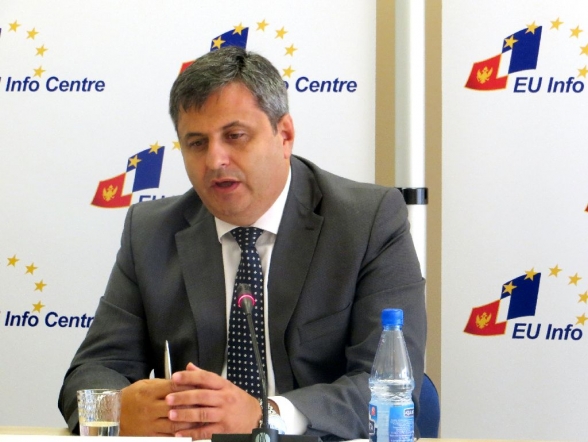Committee on European Integration organized today the public debate on ″Legislation of Montenegro and the EU in chapters 9 – Financial services and 30 – External relations″ in the premises of the EU Info Centre.
Moderator of the public debate was Mr Slaven Radunović, Chair of the Committee on European Integration of the Parliament of Montenegro and panellists were Mr Nikola Fabris Vice-Governor for Financial Stability and Payment Systems of the Central Bank of Montenegro and negotiator for Chapter 9 and Mr Goran Šćepanović Director-General for Multilateral and Regional Trade Cooperation and Economic Foreign Relations in the Ministry of Economy and the Head of the Working Group for preparation of negotiations for chapter 30.
In his opening remarks, Committee Chair Slaven Radunović presented the legal framework in Chapters 9 and 30. As he stated, Chapter 9 is consisted of the rules and mechanisms for the functioning of the institutions that provide financial services such as banks, insurance companies and pension funds, and therefore properly regulated legal framework is essential not only for progress in negotiations with the EU, but also for enhancing the level of services for citizens. On the other hand, foreign relations represent the framework for the establishment of trade relations with other countries, and how much Montenegro will be present in the global economic market would depend on such framework.
Negotiator for Chapter 9 Nikola Fabris presented the tasks Montenegro is expecting in this chapter in the next stages of negotiations. He pointed out that it is necessary to harmonize the legislation with regard to the level of bank deposits guaranteed by the state and the level of insured amounts and premiums for motor vehicle insurance, but also to work on improving the administrative capacities of the Insurance Supervision Agency. He also noted that the future period would be based on the work on creation of banking union within the Eurozone, for what Montenegro generally expressed interest in. In his words, Montenegro achieved a high level of legislation harmonization in this chapter, so there is no obstacle to its recent opening, expected in the last quarter of 2014.
Head of the Working Group for Chapter 30 Goran Šćepanović pointed out that, although this field is considered to be simple, even 25% of all EU directives fall within the domain of foreign relations. In this respect, the most important work is forthcoming in the period before accession to the EU, when it will be necessary to prepare the legal framework for accession to the EU trade agreements, but also to explain businessmen and citizens what are the real benefits of these agreements. Šćepanović stated that it is necessary to modify the set of laws so that Montenegro could comply with the regulations in the field of control of dual-use goods export, control of weapons and military equipment export, and with the regulations within the Kimberley Process, which is related to solving the problem of international trafficking in rough diamonds, through which wars and other armed conflicts are funded. In addition, upon accession, Montenegro should accept the EU Generalised Scheme of Preferences, with the aim of developing trade of small and under developing countries, as well as the commitment of budgetary allocations for development policy and humanitarian aid of the EU.
During the discussion, participants were interested in the extent to which the motor vehicle insurance premiums would be increased in the following period, as well as whether there are possibilities to increase the level of protection of bank deposits, in accordance with the levels specified in the European Union. In addition, the subject matter of the discussion were the possible consequences Montenegro would have on its trade relations with neighbouring countries upon its getting out of the CEFTA agreement when entering the EU.









